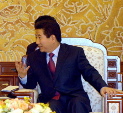BUSAN, South Korea -- The Korea Earthquake Research Center recorded a tremor in North Korea at 10:36 a.m. on Monday. It measured 3.6 on the Richter scale and was not a natural event. Shortly after the seismic activity, the Korean Central News Agency (KCNA) announced they had successfully completed a nuclear test, calling it a "historic event," and a "great leap forward." North Korea became the ninth member of the elite club of nations that possess the nuclear bomb. The test was conducted in a tunnel dug into a small mountainside near the village of Hwadae on the northeastern coast in the province of North Hamgyeong. Initial estimates of the explosion's size found it to be the equivalent to 550 tons of TNT, which is considered small by atomic bomb standards. Reaction was quick. The test garnered condemnation from the United States, South Korea, Japan, Russia, China, Indonesia, Australia, India, the European Union, the Philippines and the U.N. Security Council. However, the common reaction of the United States and South Korea deserves special attention. After several years of increasing divergence in their relationship, the incident may help the two countries rebuild a unified front in their policy toward North Korea.
Will S. Korea’s “Sunshine Policy” Crumble in N. Korea’s Atomic Twilight?

